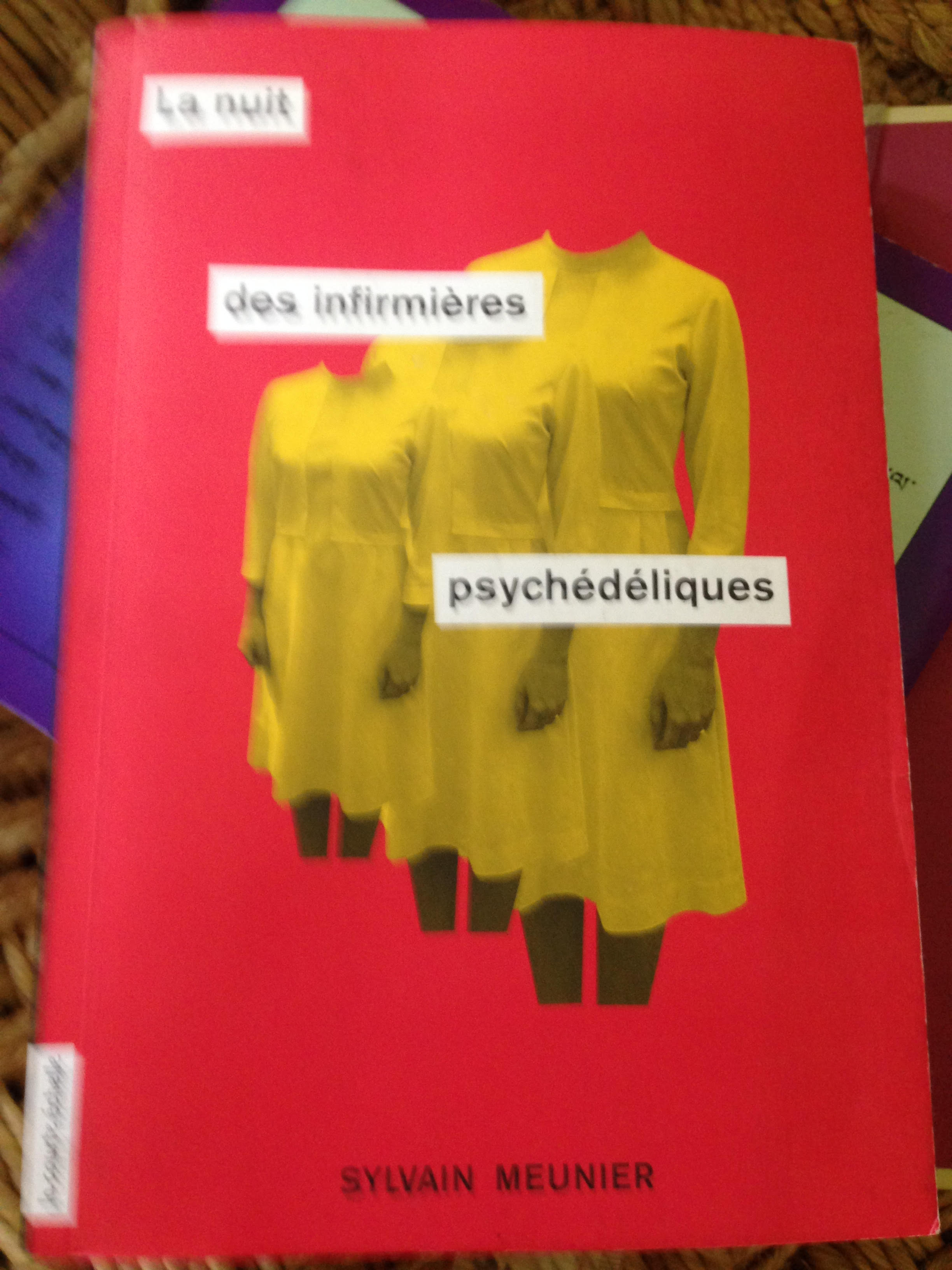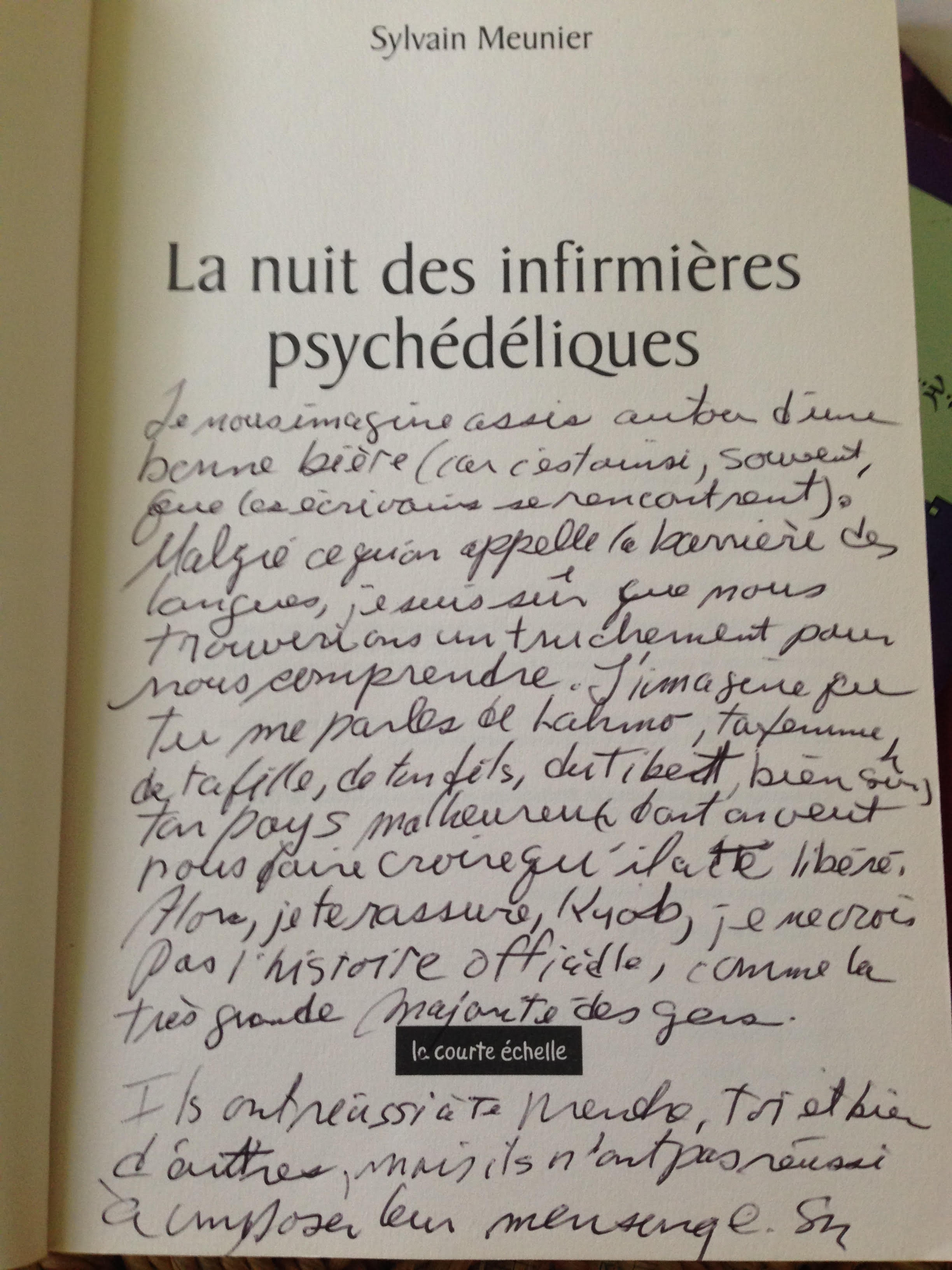‘No, We Have Not Forgotten You’: Canadian writer dedicates book to Gangkye Drupa Kyab

In a moving letter addressed to Tibetan writer Gangkye Drupa Kyab, Sylvain Meunier, a Montreal-based Quebecois writer expressed her indignation at Kyab’s unjust imprisonment.
As a gesture of solidarity, Meunier also dedicated one of her books, ‘The Night of the Psychedelic Nurses’ to Gangkye Drupa Kyab, who was released earlier this month after serving more than four years and a half in prison.
Below is the full translation of Sylvain Meunier’s letter to Gangkye Drupa Kyab (The translation in English from the original French was done by Marie-Louise Broch):
My dear Kyab,
I would like to shout out loud all the indignation I feel, but I’m going to control myself and speak very softly, so that your persecutors won’t hear me. I have the crazy hope that by whispering in this way, my voice will get around the secrecy enshrouding your detention and work its way into the cracks of the walls that are holding you in, so you will know that: No, we have not forgotten you.
Not only have we not forgotten you, the tale of your abduction by the police on that 15 February night has traveled over the mountains and borders, crossed the continents and oceans to arrive at our door. This is how I met you, Kyab. How I wish it could have been some different way!
I can imagine us sitting with a good beer (often that’s how writers meet). Despite what they call the language barrier (but maybe you know a little French, as for me I am hopeless in Tibetan), I am sure we would find a way of understanding each other.
I imagine you telling me about Lhamo, your wife, and your son and daughter, and Tibet, of course, your unhappy country that they try to make us believe they have liberated…
So let me reassure you Kyab, I don’t believe the official history, just like the great majority of people who have even a little information.
They have managed to catch you, you and the others, and they will not hesitate before any atrocity to get rid of you, but they have not managed to impose their lies. And the formidable methods they are using to try to erase the Tibetan identity will be laughable when it comes to erasing the shame of their crimes.
Let me tell you a little about Quebec – a way, perhaps, of offering your spirit a holiday, as it were.
Like Tibet, Quebec is vast and cold in winter. Like Tibet, Quebec is not a country in legal terms. Its people also had to suffer under brutal invaders who felt its existence was useless and futile. But I who am talking to you, I define myself as a writer from Quebec and there are hundreds of us. So that means they failed. And it tells me that they may also fail in Tibet – and the day may come when you are able to take up your pen quite freely. No one knows what tomorrow will bring. We must never despair.
There are already Tibetans in Quebec. If it ever became possible or necessary, I will do all I can to make sure you are welcomed here too. And then I’ll take you out for that good beer. That’s a promise.
In the meantime, I hope they let you write a little. Anyway, even when the material tools are lacking, writers go on writing, in their head. Let me leave you with this great line from a song by Francis Cabrel, which applies so well to literature: “You can destroy everything you like, she has but to open her arms to rebuild it all”.
See you later, Kyab
Gangkye Drupa Kyab was among the four Tibetan writers and intellectuals whose persecution and imprisonment was highlighted at a campaign called Livres comme l’Air (‘Books as the Air’ or a pun in French meaning ‘Free as the Air’) last November to celebrate the Day of the Imprisoned Writers. The campaign was organized by the Amnesty International Canada in conjunction with the Quebecoi Centre of PEN International and UNEQ (Quebec Writers Union). The campaign twins 10 Canadian writers with 10 jailed or harassed writers, journalists or bloggers around the world. As a gesture of solidarity, each of the 10 Canadian writers dedicated one of their books to a jailed writer, journalist or blogger.

Canadian writer Louis-Philippe Hébert dedicated his book ‘Marie Réparatrice’ to Shokjang who was sentenced to three years early this year. Montreal-born Irish writer and publisher Linda Leith dedicated her book ‘Writing in the Time of Nationalism: From Two Solitudes to Blue Metropolis’ to prominent Tibetan writer and editor Kunchok Tsephel Gopeytsang who has been serving a 15-year sentence since 2009. Stéphanie Paquin dedicated her book, ‘La Fugitive du Libéria’ (The Fugitive from Liberia) to Jangtse Dhonkho, who was released in June 2014 after serving four years in prison.


